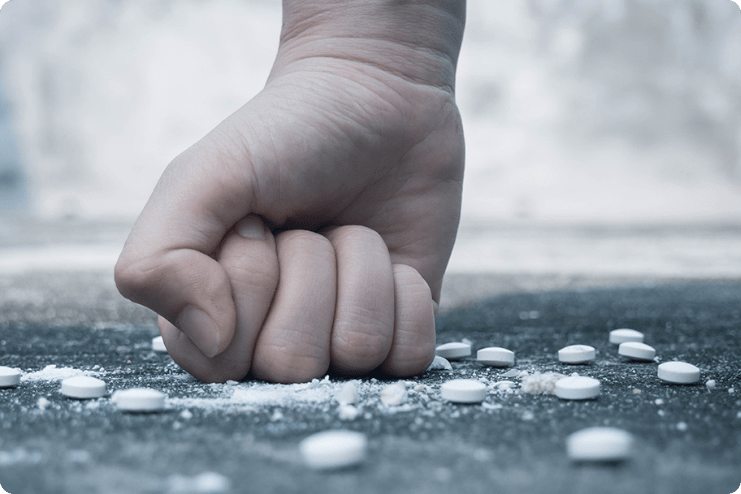What is drug addiction?
 Substance abuse is the use of substances that negatively affect the functions of the body, so do not stop using these substances, even if they are damaged by this
Substance abuse is the use of substances that negatively affect the functions of the body, so do not stop using these substances, even if they are damaged by this
The addict experiences withdrawal symptoms when he Decays from substance use. Over time, the substance increases the frequency and dose of use.
The person who is seen only 3 of the following within a 12-month period is addicted.
* Increasing the amount of substance used gradually despite the problems.
* The futility of quitting efforts.
* Spending too much time providing, using or leaving the substance.
* Reduction or cessation of social, professional and personal activities
Effects
The chemical structures of the substances used as drugs are different from each other. When used, they affect different parts of the central nervous system, causing physical and psychological destruction. There is no safe way to use drugs. For everyone who uses it, the risk of becoming addicted is equal. Our cells recognize every substance that enters the body and store it in memory so that we never forget it again. This so-called cellular learning process applies to everyone.
• It renders the mind and will useless. It distracts the person from their normal life and behavior.
* Causes nausea, vomiting, abdominal pain, constipation, diarrhea, stomach and intestinal spasms / bleeding.
• It causes damage to all internal organs and a number of concomitant diseases.
* It causes poisoning and deaths that come this way.
* Drugs reduce the individual's ability to adapt to the environment. The addict gradually becomes lonely, disconnecting from the family and the environment. Most often this picture is accompanied by severe depressions.
What to do?
• If the person is under the influence of the substance, it is useless to talk to him in this case.
• Don't talk to him until you feel ready.
• Be open, sincere and convincing, do not give advice.
* Avoid making generalizations.
• Don't talk based on your fears.
* Avoid tagging him, because it is very difficult to approach the person who is tagged “as a user”.
* Be aware of your prejudices (“They are incorrigible”), so you reduce the likelihood of miscommunication.
• Try to put yourself in his place, try to understand his thoughts, life and fears.
* Convince him with a sincere approach to seek expert help.
What shouldn't?
* Non-Acceptance-Denial: “No, my child would never use it.”
* Do not blame yourself and your partner: “This child became like this because of you." "We haven't been good parents.”
* Frustration, a sense of helplessness: “Did I raise you for this?” "It's all over, nothing can be the same anymore.”
* Anger: “I can't have a child like that!”
* Do not blame and humiliate the child: “Nothing will happen to you.”
* Making extreme decisions“ "Your school life is over.”
* Preventive factors
* Accurate age-appropriate information about drugs
* Strong and positive family ties
* Parents should be related to their children and be aware of who their children are friends with
* Family rules should be clear and everyone should follow them
* Being successful in school
* Strong ties established with institutions such as schools, NGOs and clubs
For treatment
People who use drugs and want to be treated, and their relatives who are looking for solutions to their problems in this regard, can be treated by contacting Alcohol and Substance Abuse Treatment Centers (AMATEM) and psychiatric clinics affiliated with hospitals. The treatment, which is carried out in cooperation with the patient and the doctor, takes place in the form of inpatient Decontamination in the hospital between 2-6 weeks and psycho-social treatment for a period of one year.
Never start the best prevention.
Liberation from matter is possible
* Addiction can improve, but it takes serious effort and time for full recovery to occur.
• The most important stage is when a person wants to be treated and feels ready.
* In this process, it is important to communicate correctly and share what the addict is experiencing with his relatives.
* Addiction treatment varies according to the person, the type of substance used and the duration of use.
• It is almost impossible for a person to leave the substance alone, specialist help should definitely be sought.
Risk factors
* Children of a parent with psychological problems or any substance abuse are at greater risk
* Lack of attachment and interest between parent and child (especially the lack of Decency of the ’Father' role in the home environment)
* Excessive shyness or violent behavior in the classroom
* Decline in school achievement
Prevention is important!
Studies to prevent the use and spread of addictive substances in society are carried out in order to minimize the individual and social problems caused by these substances and to ensure the development of healthy behaviors in society.
* Addiction is a disease that is quite difficult to treat after it develops.
* The cost of long-term treatments is very high.
• If the necessary socio-psychological measures are not taken after recovery, the recurrence rate of addiction is very high.
* Due to the negative impact of substance use on human health, the country's health expenditures are increasing.
• It has been observed that the cost of all kinds of prevention programs is lower than the cost of treatment.
 Substance abuse is the use of substances that negatively affect the functions of the body, so do not stop using these substances, even if they are damaged by this
Substance abuse is the use of substances that negatively affect the functions of the body, so do not stop using these substances, even if they are damaged by this